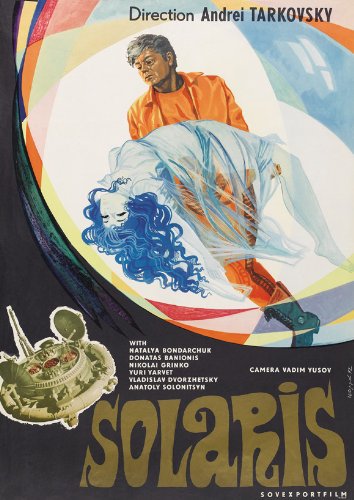Picturehouse’s ‘Spaced’ season screened Tarkovsky’s much revered Solaris. Beautifully shot, the film begs to be enjoyed on the big screen and we took this opportunity to look back at Solaris’ beautifully remastered version, and ponder on why it’s themes are still relevant today.
“Sometimes you become a clown without wanting to” says Dr Snaut in one of the scenes in Andrei Tarkovski’s Solaris. Are the film’s characters really clowns in their search for meaning in this soviet science fiction classic? There is a lot at stake in the adaptation of Stanisław Lem’s novel. Should the protagonist, Kris Kelvin, not “turn a scientific problem into a common love story”? Or should he indulge in the fantasies he encounters? After all, the hallucinations he goes through allow him to reconnect with the deceased wife. Yes, they are too good to be true, and yes, he may eventually plunge into a dangerous world of fantasy. Yet, the film addresses an issue similar to Ridley Scott’s Blade Runner. Does it really matter if our perception of reality is false? Is the objective truth really that important, if we are willing to accept its false, relative version? The late David Foster Wallace wrote in one of his letters that “Every ghost story is a love story”, a statement that is obviously very apt in relation to Solaris.
The film also expresses the Zeitgeist of the early seventies haunted by the Cold War and Space Race angsts. Neil Armstrong landed on moon just four years before the release of Tarkovsky’s Solaris. “We don’t need another planet, we need a mirror” – this quote again comes from the silver-tongued Dr Snaut. This statement remains as timely in the contemporary era of global warming and racing technology.
Solaris is a film addressing many philosophical topics in a fashion that sometimes feels overwhelming. Even though understanding of Tarkovsky’s work may be challenging, its basic point is quite clear. With the development of technology we moved away from the spiritual side of life – a theme that would emerge often in the filmography of the Russian director.
Science fiction films open a gate for really interesting storytelling and visionary representation of otherworldly events. Tarkovsky exploits the possibilities offered by the genre to its maximum. His mise-en-scene is just terrific. It often works like that of a painter or a poet. He often frames scenes in such an imaginative fashion that many of them could perfectly well be appreciated as standalone images. His ability to juxtapose nature and technology through montage only further proves why he is considered as one of the best director film history ever witnessed.
Only few other directors could match Tarkovsky’s ability to employ film language in such a disciplined, yet uncanny way. Long takes are his primary tool, but rarely does this almost three hour long film feel like its losing track of the plot. The Russian director also employs many tracking shots, zooms and close-ups that only represent how wide is his palette of devices.
This autumn Duke of York’s run a “Spaced” retrospective every Sunday. Among the films shown were such sci-fi gems as Duncan Jones’s Moon, Ridley Scott’s Alien or under appreciated The Right Stuff from Philip Kaufman. It finished with the screening of Stanley Kubrick’s 2001: A Space Odyssey, a film that doesn’t need any introduction.
Image source: IMDB

